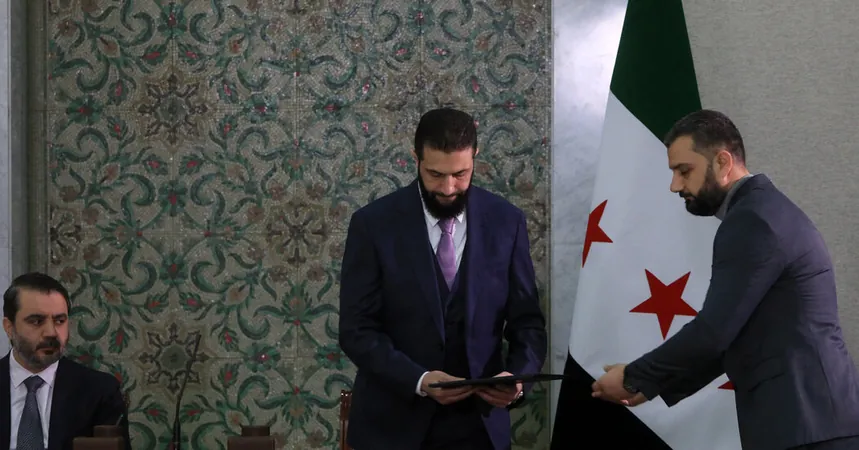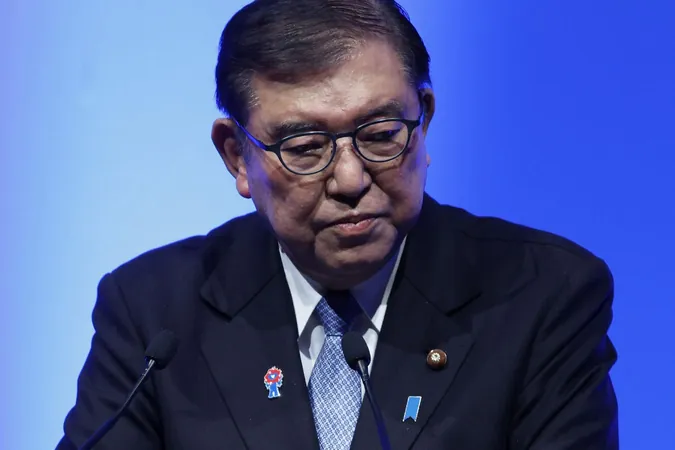
Unveiling Syria's Revolutionary Temporary Constitution: A New Era or a Familiar Tyranny?
2025-03-14
Author: Yan
Introduction
Syria is stepping into a new chapter as its interim government adopts a temporary constitution that places significant power in the hands of the interim president, Ahmed al-Shara, and retains Islamic law as the foundational component of the legal system. This shift follows the dissolution of the previous constitution under Bashar al-Assad's authoritarian regime, marking a pivotal moment for a nation emerging from decades of dictatorship and civil war.
Al-Shara, who played a key role in the overthrow of Assad last December, signed this constitutional declaration on Thursday. He has promised to establish an inclusive government, labeling this moment as the dawn of 'a new history' for Syria. The declaration includes guarantees for 'freedom of opinion, expression, information, publication, and press,' which, if genuinely upheld, would signify a dramatic departure from the oppressive surveillance state that characterized Assad's rule. Furthermore, it pledges to uphold the rights of women and all citizens throughout a five-year transitional phase, after which elections for a permanent president and parliament will take place.
Skepticism Surrounding Inclusivity
Despite the hopeful beginnings, skepticism abounds among Syria's diverse ethnic and religious groups regarding al-Shara's commitment to inclusivity, given his background as a leader of an Islamist extremist rebel faction. Questions linger about whether he has truly moved beyond his past hardline ideologies.
The President’s Unchecked Authority
The temporary constitution grants extensive executive powers to the president, including the ability to declare a state of emergency, which raises concerns about potential abuses of power. He will appoint one-third of the legislature serving as the interim parliament, while the remaining members are to be chosen through electoral commissions overseen by a committee he appoints. Judicial independence is purportedly a tenet of the new constitution; however, the president is solely responsible for appointing judges to the constitutional court, a body expected to hold him accountable. This structure sparks fears that the sweeping powers retained by the president may perpetuate the oppressive control that many hoped to leave behind.
The United Nations' special envoy for Syria, Guy Pedersen, expressed cautious optimism, stating he hopes the constitutional declaration will steer the country towards reestablishing the rule of law and fostering an orderly, inclusive transition.
Islamic Law's Enduring Influence
Remarkably, the temporary constitution maintains a provision that mandates the president to be Muslim, mirroring the stipulations of its predecessor. It designates Islamic law as the primary source of legislation while ensuring that 'freedom of belief is guaranteed.' However, the constitution warns that rights, including religious freedoms, could be curtailed in the name of national security or public order. Given al-Shara's background as an Islamist leader with prior affiliations to Al Qaeda, concerns about his commitment to moderation and democratic principles echo loudly among observers.
Minority Rights: A Fragile Promise Amidst Sectarian Tensions
Syria’s mosaic of ethnic and religious minorities remains vulnerable in this transitional landscape. The temporary constitution promises protection and non-discrimination for all Syrians, but a recent surge in violence following an attack by Assad loyalists on government forces has rekindled fears of sectarian strife. These events have led to brutal retaliatory actions against the Alawite minority, emphasizing that al-Shara hasn't fully secured control over all factions within Syria.
The reluctance of the United States and European nations to lift long-standing sanctions against Assad's government depends heavily on the new administration's commitment to inclusive governance and safeguarding minority rights. Lifting these sanctions is critical for reviving Syria's devastated economy, a formidable challenge facing al-Shara.
Meanwhile, Kurdish groups, particularly the Syrian Democratic Council, have voiced concerns over the new constitution, describing it as a 'reproduction of authoritarianism' with problematic executive powers. It remains uncertain how this discontent, particularly from the Kurdish-led forces who control parts of northeastern Syria, might influence recent agreements aimed at integrating them into the new administration’s civil and military structures.
Freedom with Caveats
The constitutional commitment to ensure freedom of opinion and expression is met with caveats, which include prohibitions against glorifying the Assad regime. As Syria stands on the precipice of change, the balance between hopes for reform and the realities of entrenched power dynamics remains precarious. Will this temporary constitution usher in genuine freedoms and a new era, or will it merely be an iteration of the old regime's authoritarianism? Only time will unravel the complexities of Syria's evolving political landscape.


 Brasil (PT)
Brasil (PT)
 Canada (EN)
Canada (EN)
 Chile (ES)
Chile (ES)
 Česko (CS)
Česko (CS)
 대한민국 (KO)
대한민국 (KO)
 España (ES)
España (ES)
 France (FR)
France (FR)
 Hong Kong (EN)
Hong Kong (EN)
 Italia (IT)
Italia (IT)
 日本 (JA)
日本 (JA)
 Magyarország (HU)
Magyarország (HU)
 Norge (NO)
Norge (NO)
 Polska (PL)
Polska (PL)
 Schweiz (DE)
Schweiz (DE)
 Singapore (EN)
Singapore (EN)
 Sverige (SV)
Sverige (SV)
 Suomi (FI)
Suomi (FI)
 Türkiye (TR)
Türkiye (TR)
 الإمارات العربية المتحدة (AR)
الإمارات العربية المتحدة (AR)